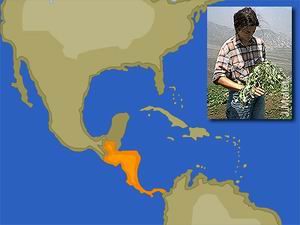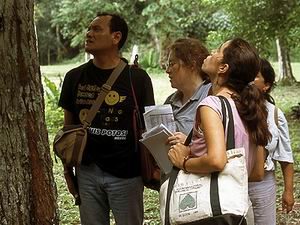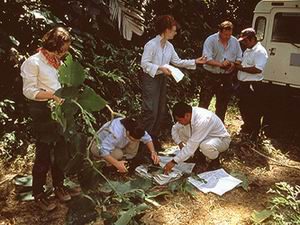Discovering and understanding
Flora Mesoamericana
Huge plant diversity
Coral reefs, pine savannas, lowland rainforests and dripping cloud forests are just a few of the different environments in the Mesoamerica region.

As a result Mesoamerica is home to an enormous diversity of plants and animals. But they are poorly understood and under threat. Mesoamerica has experienced heavy deforestation, mainly due to rapid population growth and an economic dependence on agriculture.
Convention on Biodiversity
The Convention on Biological Diversity, developed after the Rio Earth Summit in 1992, aims to preserve our precious biological diversity. It puts an obligation on national governments to protect their region's natural resources.

To fulfil their obligations, governments need to know about their country's biodiversity.
An expert in the plants of Mesoamerica, Sandy Knapp has been working with scientists in the Missouri Botanic Garden and the Institute of Biology of the Universidad Nacional Autónoma de México. They are cataloguing and describing every higher plant species in Mesoamerica.
Learn more about:
 |
Using collections
Sandy's work depends upon referring to the Museum's botanical collections. |
The Flora
Each plant species is identified. If it is new to science, it is described and given a new scientific name. This information is put together to create a botanical catalogue, or Flora, of Mesoamerica.

The growing Flora will eventually contain the descriptions of 20,000 species; about 10 per cent of them will be new to science.
Produced in printed volumes, and on the internet, in Spanish, it equips scientists, conservationists and the public with the basic taxonomic information they need to understand and conserve their local biodiversity. Scientists will be able to add new information to the flora as it is discovered.
It is the starting point for future research into the evolution and ecology of the region's plants.
Learn more about:
 |
Describing new species
How do our scientists name a new species? How does it fit into our current understanding of the natural world? |